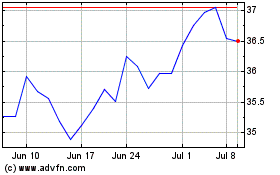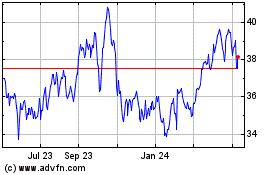By Jess Bravin and Brent Kendall
WASHINGTON -- The Supreme Court ruled Monday that defendants
can't be convicted of serious crimes under the Constitution unless
jurors are unanimous, overturning laws in two states and calling
thousands of verdicts into question.
But the court's fractured ruling has little significance for
cases outside Louisiana and Oregon, the only states where a 10-2 or
11-1 jury can convict. Instead, the justices' remarks about
precedent -- an issue of increasing importance, as the
abortion-rights decision Roe v. Wade and other liberal landmarks
face challenges -- may be the decision's most significant
legacy.
Justice Neil Gorsuch wrote Monday's opinion, overturning a
splintered 1972 decision that had left the two states' jury rules
intact.
The Sixth Amendment right to a jury trial always has required
unanimous verdicts, Justice Gorsuch wrote, a principle tracing back
through centuries of English law and recognized explicitly by the
Supreme Court in the 19th century. Such was the case in Louisiana
as well until the state's Jim Crow constitution of 1898. It adopted
the 10-2 jury to prevent the occasional African-American who made
it onto a jury from interfering with a white majority determined to
convict, the court observed.
The court rejected a challenge to that practice in the 1972
case, Apodaca v. Oregon, with a plurality opinion finding no
constitutional problem with a nonunanimous jury. To overrule that
case, Justice Gorsuch rejected the reasoning of his mentor who
wrote the decision, the late Byron White.
Justice White had argued that an "impartial jury" existed, in
the modern era, to "safeguard against the corrupt or overzealous
prosecutor and against the compliant, biased, or eccentric judge."
That could be something that could be accomplished with a 10-2 vote
as well as a unanimous one, he wrote.
Justice Gorsuch wrote that since the framers understood verdicts
to require unanimity, "as judges, it is not our role to reassess"
the wisdom of that choice. "With humility, we must accept that this
right may serve purposes evading our current notice," he wrote.
Justices Ruth Bader Ginsburg, Stephen Breyer, Sonia Sotomayor
and Brett Kavanaugh joined all or part of the Gorsuch opinion,
while Justice Clarence Thomas agreed with the outcome through a
different legal framework.
Justice Samuel Alito dissented, joined in whole or part by Chief
Justice John Roberts and Justice Elena Kagan. Justice Alito wrote
that the racist and nativist motivations that led to the initial
adoption of the jury rules were irrelevant, since they were
readopted through processes that weren't similarly tainted.
Moreover, he warned, the past 48 years have seen Louisiana and
Oregon conduct "thousands and thousands of trials under rules
allowing non-unanimous verdicts. Now, those States face a potential
tsunami of litigation on the jury-unanimity issue" and when it
should apply retroactively to existing convictions.
Still, both Louisiana and Oregon already have been moving away
from the nonunanimous-jury rule. Louisiana voters abolished it for
future cases, while Oregon is expected to amend its constitution to
the same end, according to a brief from that state.
The most significant aspects of the decision, therefore, may
turn out to be the implications for the weight the court ascribes
to precedent in future cases.
Justice Kavanaugh has wrestled with that issue before and on
Monday published a three-part test for evaluating when prior cases
should be overturned.
To do so, he wrote, the precedent must be "egregiously wrong,"
should have "significant negative jurisprudential or real-world
consequences" and shouldn't "unduly upset reliance interests" -- or
the behavior of individuals, businesses and others based on the
expectation that the precedent accurately describes the law.
The immediate victor in Monday's case was Evangelisto Ramos, who
was sent to prison without possibility of parole after a 10-2 jury
convicted him of the 2014 stabbing murder of Trinece Fedison, with
whom prosecutors said he had been "sexually involved."
"We are heartened that the Court has held, once and for all,
that the promise of the Sixth Amendment fully applies in Louisiana,
rejecting any concept of second-class justice," said Ben Cohen, an
attorney for Mr. Ramos and with the Promise of Justice Initiative,
a New Orleans nonprofit.
"Louisiana's law was based upon a previous Supreme Court ruling
that allowed for non-unanimous juries," the Louisiana attorney
general's office said. "Our law has since been changed and the
Supreme Court has now issued this new ruling, yet our focus remains
the same: to uphold the rule of law and protect victims of
crime."
In a separate decision Monday, the court addressed the cleanup
of hazardous waste sites, limiting the ability of landowners to use
private ligation to force restoration measures beyond those
required by the Environmental Protection Agency.
The case dates from 2008, when a group of 98 Montana property
owners sued Atlantic Richfield Co., a BP PLC subsidiary. The
landowners alleged the company needed to do more than the federal
government required to remediate arsenic and lead pollution in
lands surrounding a copper smelting operation near Butte.
The EPA, under the federal Superfund law, has been managing
cleanup of the site for 35 years, and Atlantic Richfield has spent
roughly $450 million so far implementing the agency's orders.
The landowners filed suit in state court to seek roughly $50
million more for property restoration. The high court, in a 7-2
opinion by Chief Justice Roberts, didn't entirely foreclose such
lawsuits but said landowners need EPA's blessing first.
The plaintiffs don't have EPA's approval, and the government has
said the landowners' plans could interfere with its cleanup,
including by digging up contaminated soil that has been
protectively capped in place.
Chief Justice Roberts took issue with the landowners' claim that
requiring EPA approval would mean they'd need a nod from the feds
even to dig out part of their backyards to make a sandbox for
grandchildren.
"The grandchildren of Montana can rest easy," the chief justice
wrote.
In dissent, Justice Gorsuch accused the court of stripping
rights from landowners and forcing them to live with toxic
waste.
"The implication here is that property owners cannot be trusted
to clean up their lands without causing trouble," Justice Gorsuch,
joined by Justice Thomas, wrote.
Write to Jess Bravin at jess.bravin@wsj.com and Brent Kendall at
brent.kendall@wsj.com
(END) Dow Jones Newswires
April 20, 2020 18:20 ET (22:20 GMT)
Copyright (c) 2020 Dow Jones & Company, Inc.
BP (NYSE:BP)
Historical Stock Chart
From Mar 2024 to Apr 2024

BP (NYSE:BP)
Historical Stock Chart
From Apr 2023 to Apr 2024
